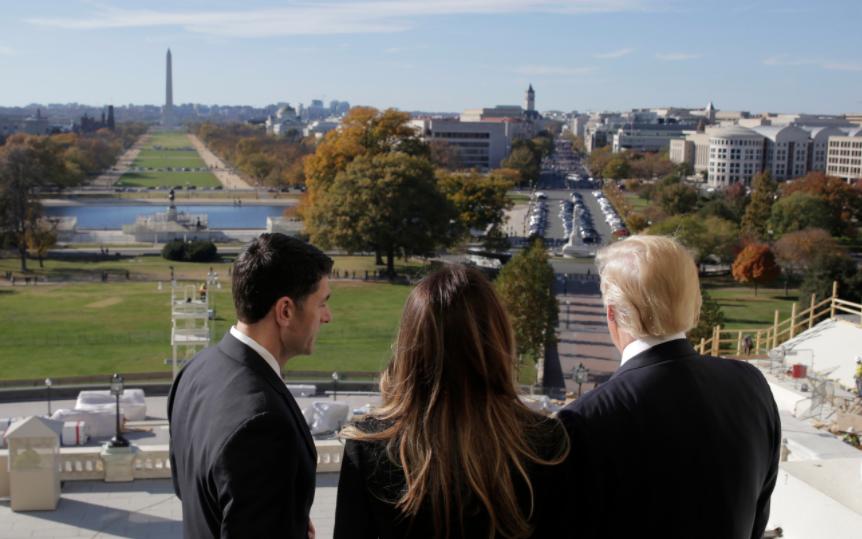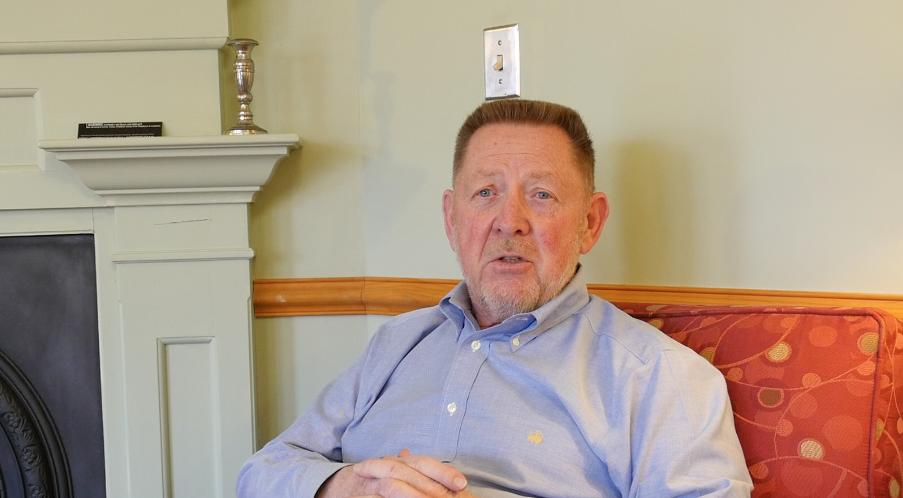
I hate to become predictable, but it is hard to resist commenting on President Trump’s first 100 days on the occasion of his first 100 days. To start, my standard of excellence is not how many new policies a President puts in place but whether he does right with the opportunities he faces. In my moments of wishful thinking, I even imagine congratulating a President for doing nothing because nothing needed to be changed.
Unfortunately, this was not the case for President Trump. He inherited the slowest recovery from recession on record, diminished support for law enforcement, foreign policy that disheartened all who depend on American strength and support, international crises, a Supreme Court vacancy, a broken system of health insurance, regulatory overreach, taxes that were driving corporations to countries that tax smarter, and a monstrous budget deficit.
He also had majorities in the House and Senate, a thoughtful and well-respected Speaker of the House and a Senate Majority leader showing unexpected backbone. This nominally favorable legislative setting raises the curve for grading his accomplishments.
Might as well get the easy ones out of the way. Supreme Court choice: A+. Justice Gorsuch was a pre-eminent Appeals Court Judge and is a man of impeccable professional integrity and character. His judicial philosophy derives from respect for statutory law and the Constitution as written, demonstrated by the fact that out of some 2700 decisions he rendered, only one was overturned. The predictable opposition had only one message: progressives expect Supreme Court justices to make decisions based on their political and social agenda rather than the written law, and Judge Gorsuch adhered to the law. Justice Gorsuch was very clear on that, when he commented that any judge who is happy with the outcome of every case he tries is a bad judge. The law may not always give the victory to the most sympathetic party in the case, and the correct decision may have consequences down the line that the judge abhors, but Justice Gorsuch understands that his job is to understand and apply the law not to create it.
Cabinet: A. My friend Bill Rolle has already written about this in the Spy and said it well. President Trump’s cabinet is the first in a long time chosen entirely on the basis of merit. His appointees are all distinguished leaders, mature, experienced, and proven. Secretary Mattis, Secretary Tillerson, Secretary Sessions, and Administrator Pruitt stand out because they have responsibility for the most critical issues facing the nation and they are doing an absolutely superb job. Taking each in turn, these four have allowed battle field commanders to do their jobs, restored assertiveness in relations with other countries, supported rather than tore down police, and moved knowledgably to review harmful regulations.
I am not very happy with the Secretary of Commerce, I give him a D- in economics, but I don’t think we need a Department of Commerce in the first place. I am ecstatic about Ambassador Haley at the UN. I didn’t think anyone could top Ambassador Bolton but she does, by a mile.
Foreign Policy: A- because nobody can do better than that. In addition to having a Secretary of State who actually puts our national interest first and does not mince words with Russia and others who oppose us, President Trump’s unique combination of tweets and personal relationships seems to be succeeding. He signals his position on global issues very effectively. He appears to have succeeded in gaining some common ground with China on the clear and present danger of North Korea while at the same time vigorously opposing China’s imperial ambitions in the South China Sea. All the worries about his susceptibility to Putin’s charms should have been put to rest by his condemnation of Russia’s role in Syria. That is the right kind of reset.
Candidate Trump’s apparent isolationism was a clear negative to me during the primaries. As President, the challenges that he has faced and no doubt the good advice of Secretaries Mattis and Tillerson seem to have convinced him that American national security requires active, if self-interested, leadership of the free world.
And it is such a refreshing change to have a President who acts when required rather than threatening and then backing down. Note the contrast between meaningless redlines versus cruise missiles to get a message to Assad in Syria. The revelation that it was the battlefield commander who was empowered to decide whether to use the MOAB bomb in Afghanistan showed that he and Secretary Mattis understand delegation and fight to win.
Regulatory Policy: A. President Trump may have been a candidate whom no one gave any chance to win, but he was ready to roll on regulatory overreach. By the time he took the oath of office, the Executive Orders needed to reduce the burden of regulation were all ready to sign. His use of Executive Orders to minimize the burden of regulations is the mirror image of his predecessor’s determination to use Presidential authority to impose regulations where Congress did not act, and differs only in that President Trump is helping rather than hurting the economy. The Republican Congress has assisted greatly in this endeavor by use of the Congressional Review Act to undo some of the most burdensome of the midnight regulations issued just before President Trump took office.
Where executive action cannot undo regulations now in place, as appears to be the case of the Clean Power Plan, Administrator Pruitt is respecting the law and moving aggressively with new regulatory proceedings and legal strategies to make changes. Secretary Tillerson is taking a reasonable approach to agreements we have entered into on climate change, favoring continued participation while retracting unrealistic and tactically unwise commitments made by his predecessors.
Immigration: Overall C, with a range from A to F. I agree with the policies in the Executive Orders issued by President Trump. Every nation has a right to decide who should enter, and it is a serious national security risk to accept inadequately vetted entrants from countries where we know terrorists are being trained to attack the U.S. I am appalled that activist judges would block the President from exercising his fundamental responsibility to protect the country from this risk, but he gets an A for trying.
At the same time, I agree that the first Executive Order was badly drafted and that ICE agents were not properly trained to carry it out. That created temporary inconvenience for a number of travellers and gave President Trump’s critics an opening they exploited immediately. Bad execution hurt the Presidency. F on implementation.
It is a slow process, but facts show that we are making progress in securing our borders to make sure that criminals as well as terrorists are excluded. President Trump is moving as he promised to use the leverage he has available to stop local governments from protecting criminals who are in the country illegally, and I cannot see why “sanctuary cities” should be given any more respect than was the University of Mississippi when President Eisenhower used the power of the Federal government to end segregation. Catch and release has ended, and realistic steps are being taken to have adequate enforcement and judicial resources to expel criminals convicted of serious crimes other than illegal entry.
The President appears to be making progress on his campaign promise about a wall, despite the continued opposition of editorial cartoonists. Given Mexico’s poor governance, which political correctness seems to demand we ignore, I cannot see a better solution to preventing entry of criminals, drugs and terrorists and putting the coyotes and their human trafficking out of business. Where I part company is that I am convinced it is both economically beneficial and consistent with American values to do away with all of our current immigration quotas. After securing the borders so that our immigration policy is enforceable, we should accept every entrant who can demonstrate a clean record, no ties to terrorism, ability to support himself or herself, and willingness to assimilate into a single American identity.
That is the other reason for my low grade. The President, any President, should be explaining that properly vetted immigration is beneficial to the economy and essential to American exceptionalism, not denigrating people based on their national origin. He is too prone to give in to the labor union propaganda that immigrants take away American jobs. Immigration from the Americas is our best hope for sustained economic growth and for growth in the congregations of our churches.
Health care and tax reform: Incomplete. Who knew that the big problem in Congress would be among Republicans rather than across the aisle? What a change in having a President who wants to sit down with opposing factions to work out a deal, rather than sitting in his ivory tower at 1600 Pennsylvania while lesser beings do their messy work. As I write, it appears that despite the dire predictions and my own lecturing of the Freedom Caucus, there is a compromise health care bill coming up, and prospects that the House and Senate will be able to move a tax reform bill thereafter.
If that happens, we will have to give substantial credit to President Trump as well as Speaker Ryan for working effectively with all parts of the Republican Party. It is bad enough that we have an ideologically gridlocked Congress, in which Democrats are driven by the belief that their billionaire progressive contributors will replace them if they compromise in any way.
It would be a disaster if Republicans were also so ideologically divided that they could not govern, but it appears that the President and the Speaker may be providing an example of how apparently irreconcilable factions can be convinced that half a loaf is better than none. And who better than President Trump to wave the half a loaf in the air and brag about getting the whole thing?
David Montgomery was formerly Senior Vice President of NERA Economic Consulting. He also served as assistant director of the US Congressional Budget Office and deputy assistant secretary for policy in the US Department of Energy. He taught economics at the California Institute of Technology and Stanford University and was a senior fellow at Resources for the Future.






 It’s become a cliché to say that Americans experience many demands on their entertainment dollars. Ringling ticket sales have declined for years. Loss of the highly popular elephants due to complaints from animal rights activists exacerbated an already fragile business model.
It’s become a cliché to say that Americans experience many demands on their entertainment dollars. Ringling ticket sales have declined for years. Loss of the highly popular elephants due to complaints from animal rights activists exacerbated an already fragile business model. Tigers and lions are always a treat, still obedient to their intrepid trainer. The clowns still provide a laugh or two, but it just seemed half-hearted. The ringmaster was mediocre, perhaps because either he enunciated poorly, or my hearing has diminished. I didn’t expect to see ice skaters nor so many stunts on ice.
Tigers and lions are always a treat, still obedient to their intrepid trainer. The clowns still provide a laugh or two, but it just seemed half-hearted. The ringmaster was mediocre, perhaps because either he enunciated poorly, or my hearing has diminished. I didn’t expect to see ice skaters nor so many stunts on ice.











